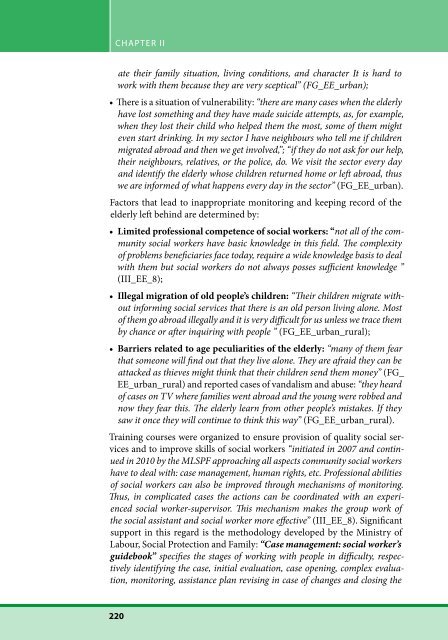specific needs of children and elderly left behind as a ... - IOM Moldova
specific needs of children and elderly left behind as a ... - IOM Moldova
specific needs of children and elderly left behind as a ... - IOM Moldova
You also want an ePaper? Increase the reach of your titles
YUMPU automatically turns print PDFs into web optimized ePapers that Google loves.
CHAPTER II<br />
ate their family situation, living conditions, <strong>and</strong> character It is hard to<br />
work with them because they are very sceptical” (FG_EE_urban);<br />
• There is a situation <strong>of</strong> vulnerability: “there are many c<strong>as</strong>es when the <strong>elderly</strong><br />
have lost something <strong>and</strong> they have made suicide attempts, <strong>as</strong>, for example,<br />
when they lost their child who helped them the most, some <strong>of</strong> them might<br />
even start drinking. In my sector I have neighbours who tell me if <strong>children</strong><br />
migrated abroad <strong>and</strong> then we get involved,”; “if they do not <strong>as</strong>k for our help,<br />
their neighbours, relatives, or the police, do. We visit the sector every day<br />
<strong>and</strong> identify the <strong>elderly</strong> whose <strong>children</strong> returned home or <strong>left</strong> abroad, thus<br />
we are informed <strong>of</strong> what happens every day in the sector” (FG_EE_urban).<br />
Factors that lead to inappropriate monitoring <strong>and</strong> keeping record <strong>of</strong> the<br />
<strong>elderly</strong> <strong>left</strong> <strong>behind</strong> are determined by:<br />
• Limited pr<strong>of</strong>essional competence <strong>of</strong> social workers: “not all <strong>of</strong> the community<br />
social workers have b<strong>as</strong>ic knowledge in this field. The complexity<br />
<strong>of</strong> problems beneficiaries face today, require a wide knowledge b<strong>as</strong>is to deal<br />
with them but social workers do not always posses sufficient knowledge ”<br />
(III_EE_8);<br />
• Illegal migration <strong>of</strong> old people’s <strong>children</strong>: “Their <strong>children</strong> migrate without<br />
informing social services that there is an old person living alone. Most<br />
<strong>of</strong> them go abroad illegally <strong>and</strong> it is very difficult for us unless we trace them<br />
by chance or after inquiring with people ” (FG_EE_urban_rural);<br />
• Barriers related to age peculiarities <strong>of</strong> the <strong>elderly</strong>: “many <strong>of</strong> them fear<br />
that someone will find out that they live alone. They are afraid they can be<br />
attacked <strong>as</strong> thieves might think that their <strong>children</strong> send them money” (FG_<br />
EE_urban_rural) <strong>and</strong> reported c<strong>as</strong>es <strong>of</strong> v<strong>and</strong>alism <strong>and</strong> abuse: “they heard<br />
<strong>of</strong> c<strong>as</strong>es on TV where families went abroad <strong>and</strong> the young were robbed <strong>and</strong><br />
now they fear this. The <strong>elderly</strong> learn from other people’s mistakes. If they<br />
saw it once they will continue to think this way” (FG_EE_urban_rural).<br />
Training courses were organized to ensure provision <strong>of</strong> quality social services<br />
<strong>and</strong> to improve skills <strong>of</strong> social workers “initiated in 2007 <strong>and</strong> continued<br />
in 2010 by the MLSPF approaching all <strong>as</strong>pects community social workers<br />
have to deal with: c<strong>as</strong>e management, human rights, etc. Pr<strong>of</strong>essional abilities<br />
<strong>of</strong> social workers can also be improved through mechanisms <strong>of</strong> monitoring.<br />
Thus, in complicated c<strong>as</strong>es the actions can be coordinated with an experienced<br />
social worker-supervisor. This mechanism makes the group work <strong>of</strong><br />
the social <strong>as</strong>sistant <strong>and</strong> social worker more effective” (III_EE_8). Significant<br />
support in this regard is the methodology developed by the Ministry <strong>of</strong><br />
Labour, Social Protection <strong>and</strong> Family: “C<strong>as</strong>e management: social worker’s<br />
guidebook” specifies the stages <strong>of</strong> working with people in difficulty, respectively<br />
identifying the c<strong>as</strong>e, initial evaluation, c<strong>as</strong>e opening, complex evaluation,<br />
monitoring, <strong>as</strong>sistance plan revising in c<strong>as</strong>e <strong>of</strong> changes <strong>and</strong> closing the<br />
220

















